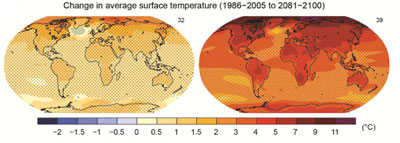The Intergovernmental Panel on Climate Change (IPCC) released its highly anticipated update on the status of climate change today, and the news is exactly what would be expected.
IPCC’s press release starts with this sentence: Human influence on the climate system is clear.
"Warming in the climate system is unequivocal and since 1950 many changes have been observed throughout the climate system that are unprecedented over decades to millennia. Each of the last three decades has been successively warmer at the Earth’s surface than any preceding decade since 1850," [when accurate measurements were first made] says the report, Climate Change 2013: the Physical Science Basis.
The report reinforces IPCC’s 2007 conclusions: global warming is real, it is caused by humans through emissions of fossil fuels and clearing forests, and it will get much worse unless immediate, prolonged and vigorous action is taken to severely reduce the world’s emissions.
"Continued emissions of greenhouse gases will cause further warming and changes in all components of the climate system," states Thomas Stocker, co-Chair of IPCC.
"Human influence has been detected in warming of the atmosphere and the ocean, in changes in the global water cycle, in reductions in snow and ice, in global mean sea level rise, and in changes in some climate extremes," the report says. "It is extremely likely that human influence has been the dominant cause of the observed warming since the mid-20th century."
"Since the early 90s, the progression of science and our understanding of the climate system and climate models and their projections has gone through a transition. From being atmosphere-only climate models to the newest system of Earth-system models, which incorporate the biogeochemical cycles, ice sheets, changes in vegetation, changes in the carbon cycle, in addition to improvements of all the other representations of clouds, the ocean, sea ice, and so on, and how they all interact together to produce a projection," says Dr. Chris Forest, professor of climate dynamics at Pennsylvania State University and one of the authors of the report.
More than 600 researchers from 32 countries reviewed over 9,000 peer-reviewed studies to produce this report. They produced 2,000 pages of scientific analysis and worked through 56,000 comments. Their assessment is sweeping, comprehensive and inescapable.
Carbon Budget
For the first time, scientists put forth a "carbon budget" for humanity – the upper limit of carbon emissions from industrial activities and forest destruction.
For Earth’s average temperature to remain below 2 degrees Celsius (3.6 F) above preindustrial levels – which all countries have agreed not to exceed – about 1 trillion tons of carbon can be burned and spewed into the atmosphere.
Just over half of that is already in the atmosphere and at current rates of emissions, the trillionth ton will be released around 2040. Over 3 trillion tons are currently in the ground, which the fossil fuel industry is intent on pursuing.
Key Points
Based on the carbon already in the atmosphere and the level of inaction, scientists expect warming to exceed the 2 C threshold, where feed-back loops and long-term changes kick in.
- Depending on how much action is taken, global temperatures will rise between 0.3-4.8 degrees Celsius (0.5-8.6 Fahrenheit)
- Sea levels have risen 7.5 inches and will rise by 10-32 inches feet more during this century. They will rise faster as the oceans warm, and glaciers and ice sheets melt.
- Concentrations of carbon, methane and nitrous oxide are at levels in the atmosphere that are "unprecedented in at least the last 800,000 years."
- The oceans have acidified as they’ve absorbed about a third of all carbon that’s been emitted – more than 90% of warming so far.
- Heatwaves will be more frequent and last longer. Regions that are currently wet will receive more rainfall, and dry regions will receive less in general.
"As a result of our past, present and expected future emissions of CO2, we are committed to climate change, and effects will persist for many centuries even if emissions of CO2 stop," concludes Stocker.



What About The Cooling Argument?
Lately, there’s been lots of media attention about claims that global warming isn’t really happening because, over the past 15 years, temperatures haven’t shown a strong upward march compared to earlier years.
While it’s interesting that the media pays more attention to those who would cast doubt on the science than they do on reporting the science itself, the IPCC simply repeats, the long term trends are clear: "Each of the last three decades has been successively warmer at the Earth’s surface than any preceding decade since 1850 in the northern hemisphere."
While people tend to use 1998 as a benchmark because it was a very hot year, since then medium-sized volcanic eruptions have cooled the climate, explains the IPCC.
This first installment of IPCC’s fifth major report covers the physical science of climate change. Three more installments will be released over the coming year – research on climate impacts, followed by mitigation strategies and lastly a synthesis report on all the installments.
Each version of IPCC’s reports since the early 1990s has resulted in greater certainty that the world is warming and greater likelihood that human activity is the principal cause.
In 2011, the International Energy Agency (IEA) released a stern report warning the world has five years before it locks in irreversible climate change.
Read our article, World Headed for Perfect Storm: Climate Change, Income Disparity, Economic Weakness
Here is the IPCC report:

In the 60 years of my life I can remember the weather being much different from childhood years until now. The goverments of all countries need to cowboy up and start getting this fixed. The sooner we start the better.